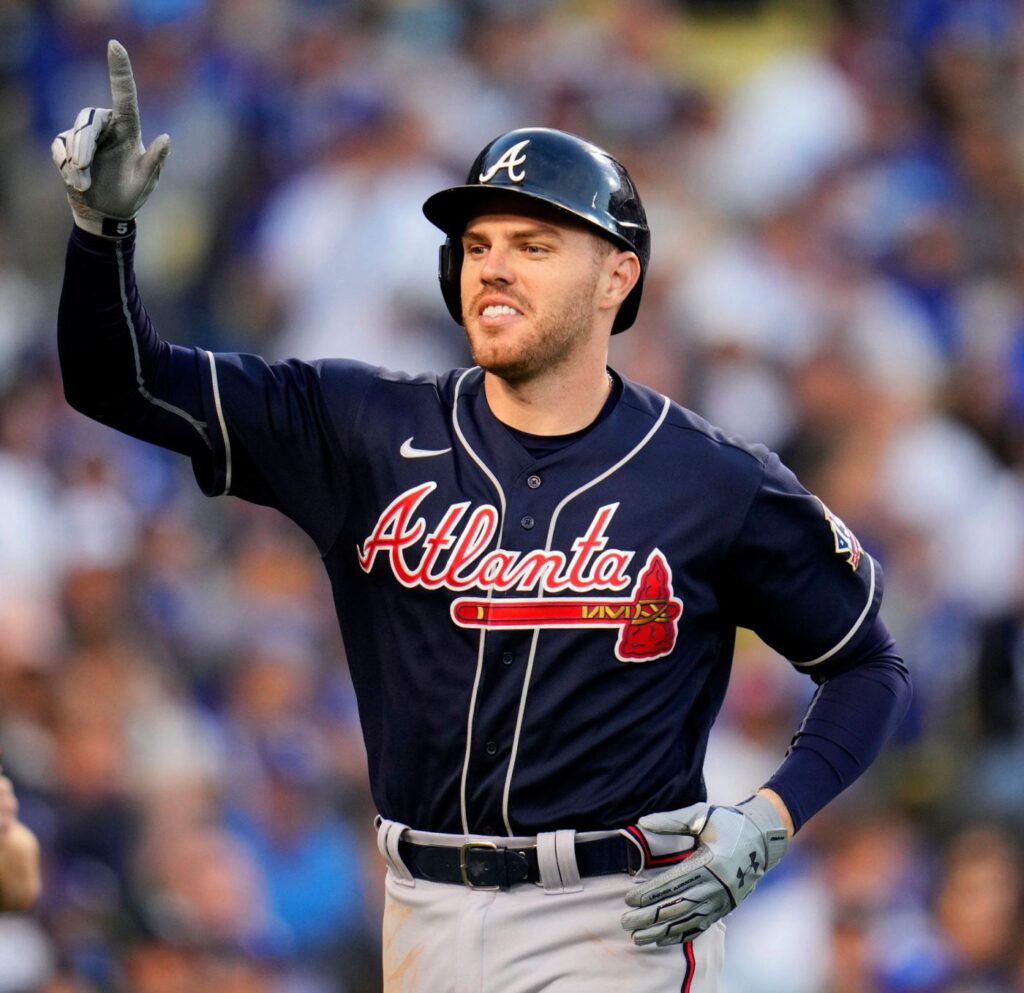
If you are a Dodger fan … well, by now I shouldn’t have to tell you how fortunate you should feel.
We are one week into baseball’s new collective bargaining agreement, which took 99 days to hash out and supposedly included elements meant to discourage tanking (including an expanded postseason). And yet other teams are already racing to the bottom.
The Cincinnati Reds shed pitchers Sonny Gray and Amir Garrett and run producers Jesse Winker and Eugenio Suarez. The Oakland A’s got rid of Chris Bassitt, Matt Olson and Matt Chapman after previously losing respected manager Bob Melvin to the Padres, and after their latest stripping of assets, the A’s main identity seems to be that of a team burning bridges in its hometown so it can follow the Raiders to Las Vegas.
And the Dodgers? Ho-hum. They picked up another former MVP. Business as usual.
The signing of 2020 MVP Freddie Freeman for six years and $162 million was almost preordained after the Atlanta Braves acquired Olson, also a left-handed hitting first baseman, and signed him for eight years and $168 million.
Yes, a six-year contract is risky for a guy who is 32 and an 11-year veteran. But the philosophy here remains the same: If you make such a long-term commitment and you win a World Series in the first few years, the back end becomes much more tolerable than it is if you don’t win.
And let’s ignore the actuarial tables for a moment, even though I know baseball people find that difficult to do. In 2021, a year after winning the National League’s MVP award, Freeman produced 31 home runs, 83 RBIs, a 133 OPS+ and a 4.7 WAR for a World Series champion, winning his third Silver Slugger award and finishing ninth in MVP balloting. He scored four runs and drove in four in the NLCS against the Dodgers, including two home runs, and added five RBIs in the World Series against Houston. In 16 postseason games, he had a 1.349 OPS.
He makes a strong lineup that much stronger. His personality makes an already good clubhouse atmosphere better. And he has something to prove because his former team – whose parent company, might we remind you, reported $568 million in baseball-related revenue in 2021 and $104 million in operating income before depreciation and amortization – decided to move on from a guy who had figured to be a Brave for life.
This is the Dodger Way, and in a greater sense, it’s the L.A. Way, as we’ve pointed out plenty of times. The currency that matters here is winning, and if it means taking that big swing to acquire a guy who can help get it done, you do it.
Sometimes it leads to a championship, as it did when the Dodgers traded for Mookie Betts in 2020 and as it did with the Rams this past season. Sometimes it goes awry, as the Lakers are currently demonstrating. But trying is better than retrenching because it shows your fans that you care as much as they do. The Dodgers retool instead of “rebuilding” – aka tanking – and that’s what the organization should be most proud of.
The players notice. Clayton Kershaw told SCNG’s Bill Plunkett in Arizona that it was “one of the reasons I wanted to come back,” and he pointedly referred to “what’s going on with some other teams right now.”
“proving to us that they really want to do whatever it takes to win. I’m thankful for that. It’s one of the reasons I wanted to come back. … You still see what’s going on with other teams right now so it’s just even more of a reason to be happy to be here.” 2/2
— Bill Plunkett (@billplunkettocr) March 17, 2022
A large part of the players’ argument during the collective bargaining stalemate was the idea that not every team was trying to win – and that a large reason for the game’s payroll disparity rested at the bottom of the list, not the top. It shouldn’t be a surprise that the Reds (whose owner, Bob Castellini, didn’t want to raise the luxury tax threshold at all) and A’s (who were in a build/teardown-build/teardown mode well before John Fisher took control of the club in 2016) have already started shedding talent. Their projected Opening Day payrolls, according to Cot’s Baseball Contracts, are $97 million (20th) and $53.2 million (27th), respectively.
This May 1 it will have been a decade since Mark Walter and Guggenheim Baseball took over the Dodgers from Frank McCourt, whose operating philosophy was that it was foolish to spend to win a championship when he could win the division with a lower payroll (and, as it turned out, spend the savings on himself). That’s not hyperbole, either. A statement attesting to such was read into the record of the court proceedings during Frank’s divorce from Jamie McCourt.
The post-McCourt 2012 Dodgers went 88-74 and missed the second wild-card spot by two games. They haven’t missed the postseason since, have won more than 100 games three times in the last five years, and have made it clear with every decision that one World Series championship isn’t enough.
Not every transaction works out, of course. We were leery of last year’s Trevor Bauer signing at the time it occurred because this was a square peg/round hole scenario, a “me” guy dropped into a “we” clubhouse. Bauer remains on administrative leave while MLB continues its investigation of the sexual assault allegations against him, but I can’t help but think that even without those allegations he would have done something to run afoul of the clubhouse culture.
But in general, this Dodgers management team has earned the benefit of the doubt. That’s far more than we can say for many of baseball’s other front offices.
jalexander@scng.com
@Jim_Alexander on Twitter
